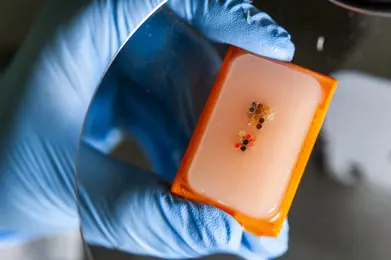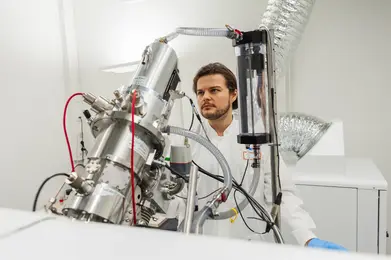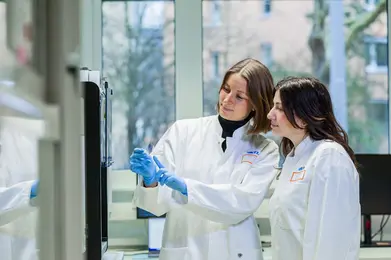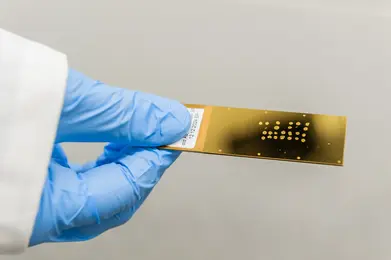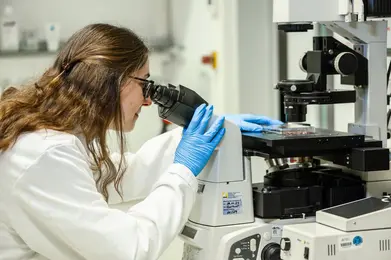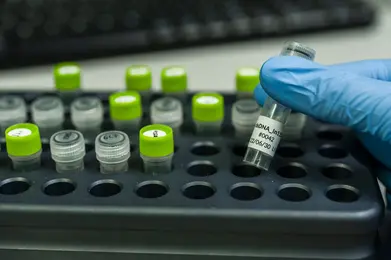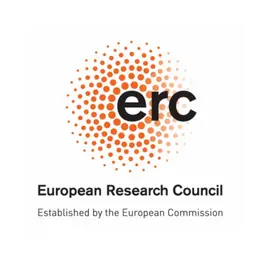Systems Immunology and Single Cell Biology
- Immunology, Infection and Cancer
- Junior Research Group

Dr. Felix Hartmann
Group Leader
The Hartmann Lab at DKFZ leverages cutting-edge spatial single-cell methods such as multiplexed ion beam imaging (MIBI) to unravel how cellular and metabolic interactions within the tissue microenvironment shape immune responses against human cancers.
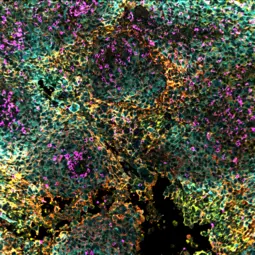
Research in the Hartmann Group
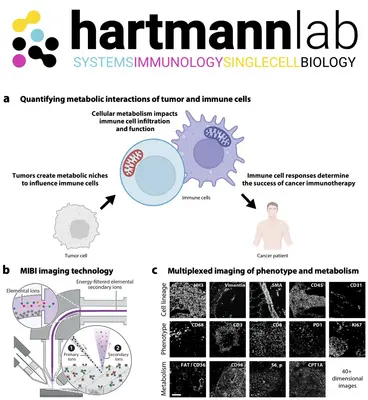
The progression and clinical outcome of human cancer are influenced by cellular interactions in the tissue microenvironment. Our lab strives to understand how such interactions influence the behavior of the human immune system. Specifically, we are studying how metabolic interactions between T cells, macrophages, and tumor cells determine immune function and tumor progression.
We employ a novel proteomic imaging technology termed multiplexed ion beam imaging (MIBI) to address these questions. MIBI enables the simultaneous quantification of more than 40 proteins and their spatial localization directly in human tissues. We have established the MIBI technology at the DKFZ and have set up all necessary experimental and analytical workflows. Now, we are using these workflows to analyze the metabolic regulation of human immune cells in clinical tissues. In addition, we are conducting functional studies on the relevance of metabolic pathways using genetic manipulation and human organoid cultures. In short, our research combines:
Systems Immunology: Analysis of the immune system in human tissues via multiplexed imaging. Together with clinicians, we profile human tissue samples from clinical trials focusing on cancer, inflammation/autoimmunity, and cardiovascular disease.
Single-Cell Biology: We develop experimental tools to study novel aspects of cell biology on the single-cell level, for example, the connection between metabolic reprogramming and epigenetic modifications.
Computational Biology: In collaboration with computational scientists, we apply machine learning approaches that utilize the single-cell and subcellular nature of our high-dimensional imaging datasets.
Overall, our lab aims to advance our understanding of the interactions between the immune system and the local tissue structure and thus contribute to future improvements in human cancer immunotherapy.
Members of the Hartmann Lab
We are a young and international group, and believe that leveraging interdisciplinary expertises within the team enables great research.
- Show profile

Dr. Felix Hartmann
Group Leader
-

Dr. Loan Vulliard
Postdoctoral Researcher
-

Dr. Yu-Le Wu
Postdoctoral Researcher
-

Sven Truxa
Postdoctoral Researcher
-

Miray Cetin
PhD Student
-

Jennifer Zimmermann
PhD Student
-

Kilian Merz
PhD Student
- Show profile

Domenico Calafato
PhD Student
-

Kathleen Schlüter
PhD Student
-

Simon Frank
Master Student
-

Leonie Ellen Sander
Bachelor Student
-

Vincent Paul
Bachelor Student
-

Philippe Aumont
Master Intern
-

Lara Schneider
Lab Technician
-

Paul Esslinger
Junior Research Staff
The Hartmann Lab in January 2025
Hartmann Lab Alumni
(Most recent alumni on top)
Bénédicte Lenoir, PhD (Project manager)
Lea Ahrens, B.Sc. (Master intern)
Charu Sharma, M.Sc. (Master student)
Daniel Gehrig (Lab technician)
Ahmed Amine-Anzali, M.Sc., Dipl-Ing. (Master student)
Elisaveta Platonova, B.Sc. (Bachelor student)
Lena-Marie Schmitt, M.Sc. (Master student)
Maria Solivellas Pieras, B.Sc. (Bachelor student)
Tara Ziegelbauer, M.Sc. (Master student)
Tim Kempchen, M.Sc. (Master student)
Teresa Anthea Glauner, M.Sc., M.Sc. (Staff scientist)
David Glass, PhD (Visiting scientist)
Koen Kemna, B.Sc. (Master intern)
Lars Noller (Lab technician)
Hanna Conrad, B.Sc. (Bachelor student)
Selected Publications
Hartmann, F. J.
Tanevski J., Vulliard L., Ibarra-Arellano M., Shapiro D., Hartmann F. J. & Saez-Rodriguez J.
Glauner T. A., Truxa S., Cetin M., Schlüter K., Calafato D., Hartmann, F. J.
Cosgrove, J., Marçais, A., Hartmann, F. J., Bergthaler, A., Zanoni, I., Corrado, M., Perié, L., Cabezas-Wallscheid, N., Bousso, P., Alexandrov, T., Kielian, T., Martínez-Martín, N., Opitz, C. A., & Lyssiotis, C. A.
Hartmann, F. J., Mrdjen, D., McCaffrey, E., Glass, D. R., Greenwald, N. F., Bharadwaj, A., Khair, Z., Verberk, S. G. S., Baranski, A., Baskar, R., Graf, W., Van Valen, D., Van den Bossche, J., Angelo, M., & Bendall, S. C.
Open Positions
We are continously looking for motivated people to join our laboratory and we offer positions in various stages.
Clinician Scientists: Please apply through the DKFZ Clinician Scientist Program and also send your application directly to Dr. Felix J. Hartmann.
Postdocs: Please email your application to Dr. Felix J. Hartmann and include a cover letter stating your research interest, your CV with a complete list of publications as well as contact details of 3 references. Also check out the International Postdoc Program at the DKFZ.
PhD students: Please apply through the International PhD Program of the DKFZ and also send your application directly to Dr. Felix J. Hartmann.
Get in touch with us

Dr. Felix Hartmann
Group LeaderPostal address:
